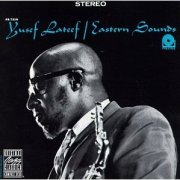 With the temperature dropping, it's time to find someone to keep you warm. Find your hookups with our online dating guide!
With the temperature dropping, it's time to find someone to keep you warm. Find your hookups with our online dating guide!
- Jazz
- 1962
- Buy the CD
Reviewed by Michael Fortes
()
Lateef, who in addition to his mastery of flute and tenor sax holds a Masters degree in music education and a Ph.D in education, knocked this record out in a single session back on September 5, 1961, with Barry Harris on piano, Ernie Farrow on bass and Lex Humphries on drums. Much like Dave Brubeck’s successful excursions into the exotic side of jazz, Lateef made Eastern Sounds “accessible” by keeping his pieces short and to the point, with the album’s nine tracks all clocking in at six minutes or less. Ups for the other contributing factors to the ever-changing quality of “accessibility” here, including: the generally chill mood of all the tunes (this album was originally part of Prestige’s “Moodsville” series after all); the welcoming melodic nature of the tunes; and the presence of the old (as in 1930s old) pop standard “Don’t Blame Me,” as well as the “Love Theme from Spartacus.”
It’s worth noting that, even though this generally goes without saying when it comes to classic acoustic jazz pre-British Invasion, that when movie themes and old pop tunes were “covered” (let’s face it, “reinterpreted” is usually the more accurate term when it comes to jazz) by dudes like Lateef, Coltrane, Miles, et al, it’s not considered a “sellout” move. That, presumably, has a lot to do with the fact that the tune simply becomes a vehicle for the artists’ individual expressions. Eastern Sounds is a fine example of this – whether Lateef is playing a Chinese globular flute with a five note range on an original tune as his bass player opts instead for an Indian rabat, or whether Lateef picks up his tenor sax and blows some standard mellow jazz, that searching individuality which we see in the striking black and white cover photo (we’re looking straight at Lateef’s shiny bald head, yet he is looking not back at us but off to the side, glasses on) comes through on all the tracks. The feeling carries through, and he did the “Moodsville” series proud while remaining true to his muse. This in itself makes the album remarkable. That it’s also easily digestible by those with short attention spans makes it even better.
Thanks to the fine folks at Concord Music Group’s Collectors Corner website (and eBay, of course, we know you’re looking there too), Eastern Sounds can be heard yet again “as nature intended.” The standard-weight single LP is presented in much the same fashion as what was once marketed as the “Original Jazz Classics” series before Concord bought the Fantasy Jazz catalog – with original cover art, no new remastering or extra inserts (this particular album’s last remastering was done in 1991, as noted on the back cover), original liner notes printed on the back cover, and retro black and yellow Prestige labels. Some tape deterioration can be heard if you pay close enough attention, and this reviewer’s particular sample copy did play back with a little bit of intermittent static during the first 20 seconds or so of side one. Such imperfections will naturally come up from time to time with vinyl, and in this case, it was not significant enough to ruin the listening experience.
You can follow us on Twitter and Facebook for content updates. Also, sign up for our email list for weekly updates and check us out on Google+ as well.











